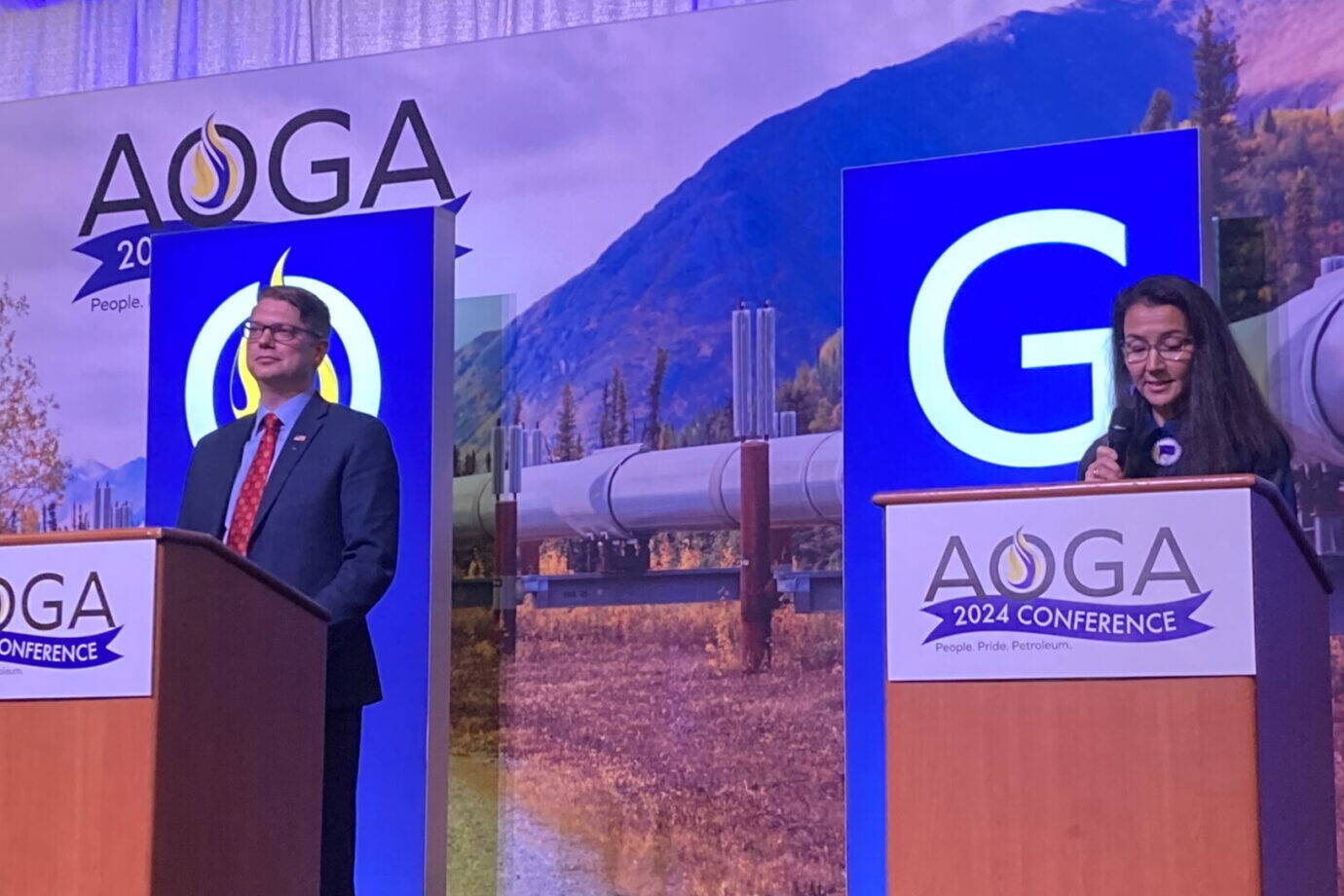Democratic U.S. Rep. Mary Peltola said in a candidate forum on Wednesday that she has worked across the partisan aisle to advance the interests of Alaska’s oil and gas industry, while Republican challenger Nick Begich III said Peltola’s party is working against the state.
Peltola and Begich faced off at the Alaska Oil and Gas Association’s annual conference at the Dena’ina Center in Anchorage, five days after the third major candidate, Republican Lt. Gov. Nancy Dahlstrom, withdrew from the race. The forum was the first debate of the year for Peltola and Begich, who also competed in special and regular elections in 2022, when the third major candidate was former Gov. Sarah Palin.
Peltola began her introduction with a one-word exclamation that drew applause: “Willow!” She said she helped convince President Joe Biden to approve the North Slope development, a theme she returned to repeatedly during the 40-minute event.
“I am the advocate for resources, for the resource industry in Washington, D.C.,” Peltola said. “I’ve spoken out against this administration’s attempts to slow it down, to slow down exploration and production.”
Begich said the industry would have no better friend than him, and that Democrats want to shut down the trans-Alaska pipeline, referring to a petition that asks the federal government to study ways to phase out North Slope oil production.
“The Democrats have it out for Alaska oil and gas — 66 executive orders affecting our state, and counting,” Begich said. He said an example of the federal government’s approach is a Biden administration action on Tuesday to keep 28 million across free of large-scale development.
While the national political parties are deeply divided in Congress, the two candidates took similar positions on industry concerns at the forum, with both highlighting their advocacy of Alaska oil and other projects. Both said they support cutting regulations that delay Alaska projects and oppose Democratic presidential candidate Vice President Kamala Harris’ endorsements of taxing unrealized capital gains and increasing the corporate income tax rate. Begich described the unrealized capital gains tax for those with more than $100 million as a policy seen in socialist or communist governments.
They criticized each other. Both candidates recognized the legacy of Republican Congressman Don Young, saying he championed Alaska’s interests. But Peltola pointed out that Begich challenged Young in a primary, and she questioned whether he was driven by personal ambition rather than the state’s best interest.
Begich said they should look forward, while saying that Peltola failed to influence Biden administration and congressional actions regarding Alaska.
“Some voters thought that perhaps having a Democrat in office would be a good thing — then maybe we would be able to make some traction with the administration,” he said. “Unfortunately, it appears as if no one’s listening. Why do you think it is that you have so little influence with your colleagues in the House when it comes to Alaska resources?”
Peltola cited the example of Willow.
“I was able to sit in a room with both of our senators and convince the president of the United States that we need to listen to the people of the North Slope Borough, we need to listen to Alaska Natives,” Peltola said.
Begich said he would like to see Congress follow up on a recent Supreme Court decision saying courts shouldn’t defer to federal agencies’ legal interpretations, by passing a law making federal permitting of projects more certain.
“We look at how the left in this country has weaponized what I’m going to call the carbon lie, or the carbon economy, right? And they’ve weaponized it against everyone in this room,” Begich said, criticizing methods that attribute the social costs of climate change to fossil fuel production. “They’re trying to use these methodologies to shut us down.”
Peltola said oil will always be part of energy production in the U.S.
“I am a reasonable, practical person, and I am articulate, and I’m able to … explain Alaska to the Lower 48 and I will always continue to do that, and I feel like I do have a long record of recognizing our energy challenges across Alaska and across the United States and working to find solutions,” she said.
Peltola responded to an audience question about missed votes by citing close family deaths, ruefully adding: “My hope is that in the next two years, my mother and my husband don’t die.”
The two other, lesser-known candidates who are on track to be on the ranked choice voting ballot in November — Republican Matt Salisbury and Alaskan Independence Party leader John Wayne Howe — were not invited to the event. If neither major candidate exceeds 50% of the vote in the first count, the voters who listed a trailing candidate first will have their votes allocated to their second choice, with the process repeating until there is a winner.
• Andrew Kitchenman has covered state government in Alaska since 2016, serving as the Capitol reporter for Alaska Public Media and KTOO before joining the Alaska Beacon. Before this, he covered state and local governments on the East Coast – primarily in New Jersey – for more than 15 years. He enjoys reading, watching movies and walking around Anchorage. This article originally appeared online at alaskabeacon.com. Alaska Beacon, an affiliate of States Newsroom, is an independent, nonpartisan news organization focused on connecting Alaskans to their state government.

